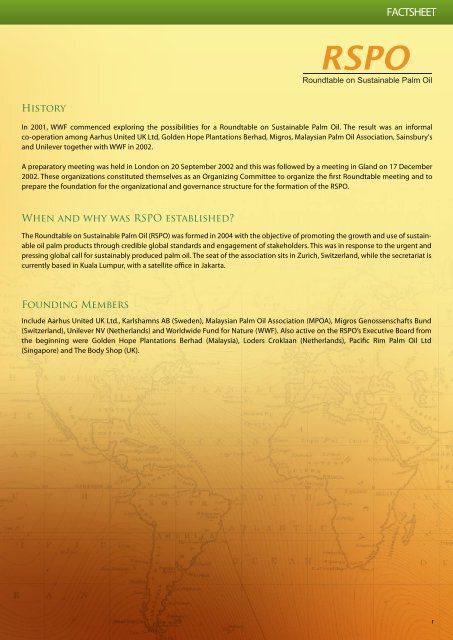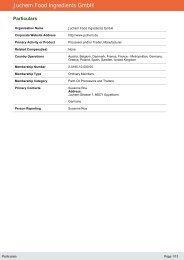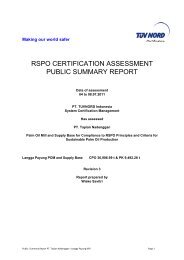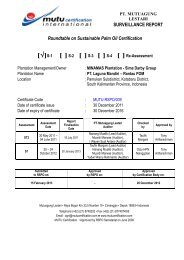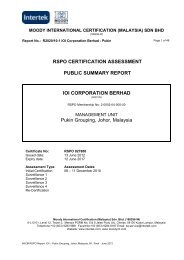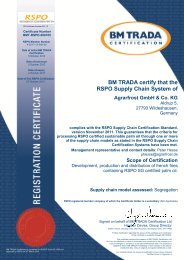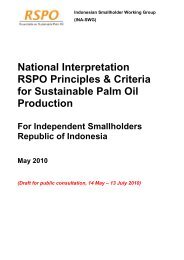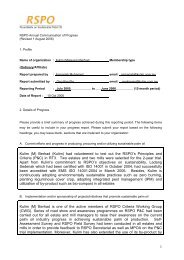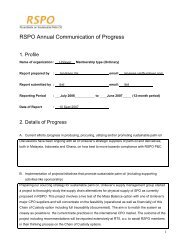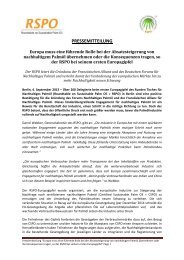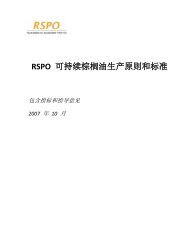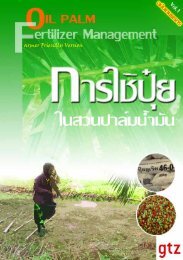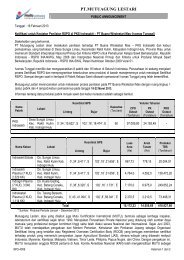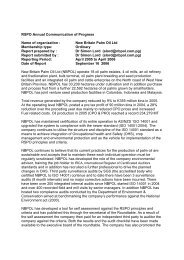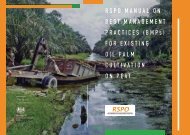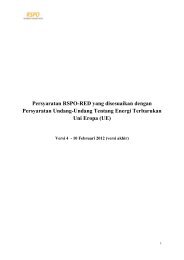FACTSHEET - Roundtable on Sustainable Palm Oil
FACTSHEET - Roundtable on Sustainable Palm Oil
FACTSHEET - Roundtable on Sustainable Palm Oil
You also want an ePaper? Increase the reach of your titles
YUMPU automatically turns print PDFs into web optimized ePapers that Google loves.
<str<strong>on</strong>g>FACTSHEET</str<strong>on</strong>g><br />
RSPO<br />
<str<strong>on</strong>g>Roundtable</str<strong>on</strong>g> <strong>on</strong> <strong>Sustainable</strong> <strong>Palm</strong> <strong>Oil</strong><br />
History<br />
In 2001, WWF commenced exploring the possibilities for a <str<strong>on</strong>g>Roundtable</str<strong>on</strong>g> <strong>on</strong> <strong>Sustainable</strong> <strong>Palm</strong> <strong>Oil</strong>. The result was an informal<br />
co-operati<strong>on</strong> am<strong>on</strong>g Aarhus United UK Ltd, Golden Hope Plantati<strong>on</strong>s Berhad, Migros, Malaysian <strong>Palm</strong> <strong>Oil</strong> Associati<strong>on</strong>, Sainsbury's<br />
and Unilever together with WWF in 2002.<br />
A preparatory meeting was held in L<strong>on</strong>d<strong>on</strong> <strong>on</strong> 20 September 2002 and this was followed by a meeting in Gland <strong>on</strong> 17 December<br />
2002. These organizati<strong>on</strong>s c<strong>on</strong>stituted themselves as an Organizing Committee to organize the first <str<strong>on</strong>g>Roundtable</str<strong>on</strong>g> meeting and to<br />
prepare the foundati<strong>on</strong> for the organizati<strong>on</strong>al and governance structure for the formati<strong>on</strong> of the RSPO.<br />
When and why was RSPO established?<br />
The <str<strong>on</strong>g>Roundtable</str<strong>on</strong>g> <strong>on</strong> <strong>Sustainable</strong> <strong>Palm</strong> <strong>Oil</strong> (RSPO) was formed in 2004 with the objective of promoting the growth and use of sustainable<br />
oil palm products through credible global standards and engagement of stakeholders. This was in resp<strong>on</strong>se to the urgent and<br />
pressing global call for sustainably produced palm oil. The seat of the associati<strong>on</strong> sits in Zurich, Switzerland, while the secretariat is<br />
currently based in Kuala Lumpur, with a satellite office in Jakarta.<br />
Founding Members<br />
Include Aarhus United UK Ltd., Karlshamns AB (Sweden), Malaysian <strong>Palm</strong> <strong>Oil</strong> Associati<strong>on</strong> (MPOA), Migros Genossenschafts Bund<br />
(Switzerland), Unilever NV (Netherlands) and Worldwide Fund for Nature (WWF). Also active <strong>on</strong> the RSPO’s Executive Board from<br />
the beginning were Golden Hope Plantati<strong>on</strong>s Berhad (Malaysia), Loders Croklaan (Netherlands), Pacific Rim <strong>Palm</strong> <strong>Oil</strong> Ltd<br />
(Singapore) and The Body Shop (UK).<br />
1
Who is the RSPO?<br />
implement global standards for sustainable palm oil. The stakeholders involved in this initiative are - oil palm producers, palm oil processors<br />
or traders, c<strong>on</strong>sumer goods manufacturers, retailers, banks and investors, envir<strong>on</strong>mental or nature c<strong>on</strong>servati<strong>on</strong> NGOs and social or<br />
developmental NGOs.<br />
RSPO’s objectives<br />
The <str<strong>on</strong>g>Roundtable</str<strong>on</strong>g> promotes palm oil producti<strong>on</strong> practices that help reduce deforestati<strong>on</strong>, preserve biodiversity, and respect the livelihoods<br />
of rural communities in oil- producing countries. It ensures that no new primary forest or other high c<strong>on</strong>servati<strong>on</strong> value areas are<br />
of plantati<strong>on</strong> workers, smallholders and indigenous people are wholly respected.<br />
It is with this view that the <str<strong>on</strong>g>Roundtable</str<strong>on</strong>g> <strong>on</strong> <strong>Sustainable</strong> <strong>Palm</strong> <strong>Oil</strong> (RSPO) proactively engages with oil palm growers, oil processors, food<br />
companies, retailers, NGOs and investors to work together towards a global supply of palm oil that is produced in a socially and envir<strong>on</strong>mentally<br />
resp<strong>on</strong>sible way.<br />
Governance Structure<br />
This multi-stakeholder representati<strong>on</strong> is mirrored in the governance structure of RSPO. Seats in the Executive Board and project level<br />
Working Groups are fairly allocated to each sector to ensure fair representati<strong>on</strong>.<br />
agendas to the roundtable, facilitating traditi<strong>on</strong>ally adversarial stakeholders and business competitors to work towards a comm<strong>on</strong> goal<br />
and decisi<strong>on</strong>s are made by c<strong>on</strong>sensus. These values underpin every aspect of how RSPO behaves and treats its stakeholders.<br />
Visi<strong>on</strong><br />
RSPO will transform markets to make sustainable palm oil the norm.<br />
Missi<strong>on</strong><br />
•<br />
• To develop, implement, verify, assure and periodically review credible global standards for the entire supply chain of sustainable<br />
palm oil;<br />
• To m<strong>on</strong>itor and evaluate the ec<strong>on</strong>omic, envir<strong>on</strong>mental and social impacts of the uptake of sustainable palm oil in the market;<br />
• To engage and commit all stakeholders throughout the supply chain, including governments and c<strong>on</strong>sumers.<br />
• The supply chain includes ecosystems, communities, growers, traders, processors, c<strong>on</strong>sumer goods manufacturers, retailers,<br />
2
Milest<strong>on</strong>es<br />
August 2003<br />
First <str<strong>on</strong>g>Roundtable</str<strong>on</strong>g> Meeting (RT) took place in Kuala Lumpur, Malaysia and was attended by 200 participants from 16 countries.<br />
8 April 2004<br />
RSPO was formerly established under Article 60 of the Swiss Civil Code.<br />
August 2004<br />
47 organizati<strong>on</strong>s signed a Statement of Intent declaring their intenti<strong>on</strong> to participate in the RSPO Initiative.<br />
November 2005<br />
The RSPO Principles and Criteria (P&C) were adopted for an initial pilot implementati<strong>on</strong> period of two years by 14 companies.<br />
2006<br />
Creati<strong>on</strong> and adopti<strong>on</strong> of Members’ Code of C<strong>on</strong>duct; RSPO Ind<strong>on</strong>esian Liais<strong>on</strong> Office (RILO) established in Jakarta.<br />
October 2007<br />
The RSPO Principles and Criteria (P&C) were reviewed by the RSPO Criteria Working Group (CWG). The review included public c<strong>on</strong>sultati<strong>on</strong>s;<br />
meetings; soliciting of public comments; inputs from nati<strong>on</strong>al interpretati<strong>on</strong>s; smallholder taskforce deliberati<strong>on</strong>s and pilot field<br />
trial results.<br />
November 2007<br />
RSPO Certificati<strong>on</strong> System was approved by the RSPO Executive Board and adopted by General Assembly (GA4) and officially launched at<br />
RT5 (the 5th <str<strong>on</strong>g>Roundtable</str<strong>on</strong>g> Meeting <strong>on</strong> <strong>Sustainable</strong> <strong>Palm</strong> <strong>Oil</strong>) by the then H<strong>on</strong>. Minister of Plantati<strong>on</strong>s Industries & Commodities, Malaysia,<br />
Datuk Peter Chin Fah Kui in Malaysia.<br />
2008<br />
Nati<strong>on</strong>al Interpretati<strong>on</strong>s (NIs) of the generic Principles & Criteria for Ind<strong>on</strong>esia, Malaysia and PNG approved.<br />
21 August 2008<br />
Approval for the 1st P&C certificati<strong>on</strong> for United Plantati<strong>on</strong>s. Inaugural shipment of CSPO arrived in Rotterdam in November.<br />
August 2008<br />
The RSPO Supply Chain Certificati<strong>on</strong> Systems was developed and finalized.<br />
August 2008<br />
November 2009: The RSPO Supply Chain Certificati<strong>on</strong> Systems was reviewed and adopted.<br />
October 2010<br />
RSPO membership reached 500 Ordinary Members from around the world.<br />
2010<br />
First RSPO certificate was issued to Latin America, Daab<strong>on</strong> Group, Colombia<br />
June 2011<br />
Launch of the RSPO Trademark<br />
25 August 2011<br />
3 years since the certificati<strong>on</strong> of sustainable palm oil, the industry reaches a turning point by hitting its first I milli<strong>on</strong> hectares of certified<br />
producti<strong>on</strong> area around the world.<br />
25 August 2011<br />
The inaugural certificati<strong>on</strong> of sustainable palm oil in Brazil by Agropalma.<br />
25 August 2011<br />
The global producti<strong>on</strong> of CSPO reaches 5 milli<strong>on</strong> t<strong>on</strong>nes, 10 percent of global palm oil producti<strong>on</strong>.<br />
November 22, 2011<br />
A record achievement of over 1000 attendees at RT9 from over 20 countries.<br />
3
RSPO Principles and Criteria<br />
The RSPO Principles and Criteria for <strong>Sustainable</strong> <strong>Palm</strong> <strong>Oil</strong> Producti<strong>on</strong> (RSPO P & C) are the global guidelines for producing palm oil sustainably.<br />
These include standards for palm oil plantati<strong>on</strong>s <strong>on</strong> dealing fairly with employees, smallholders and impacted communities,<br />
c<strong>on</strong>serving natural resources and biodiversity, and developing new plantings in resp<strong>on</strong>sible ways.<br />
The palm oil supply chain, from the tropics to its use as an ingredient in retail products all over the world, is complex. To preserve the<br />
integrity of RSPO palm oil, players al<strong>on</strong>g the supply chain wishing to use it have to do so transparently to allow traceability. The transparency<br />
and traceability is assured through the RSPO Supply Chain Certificati<strong>on</strong>.<br />
The <str<strong>on</strong>g>Roundtable</str<strong>on</strong>g> has set up certificati<strong>on</strong> schemes to assure oil processors and c<strong>on</strong>sumers that the sustainable palm oil they purchase<br />
indeed supports plantati<strong>on</strong>s that operate in a sustainable way. Independent, well-established, RSPO- approved certificati<strong>on</strong> bodies are<br />
resp<strong>on</strong>sible for carrying out audits at plantati<strong>on</strong>s and mills. The audits will cut across, the entire supply chain.<br />
The 8 Principles include:<br />
• Principle 1: Commitment to transparency; NGO<br />
• Principle 2: Compliance with applicable laws and regulati<strong>on</strong>s<br />
• Principle 3: Commitment to l<strong>on</strong>g-term ec<strong>on</strong>omic and financial viability<br />
• Principle 4: Use of appropriate best practices by growers and millers<br />
• Principle 5: Envir<strong>on</strong>mental resp<strong>on</strong>sibility and c<strong>on</strong>servati<strong>on</strong> of natural resources and biodiversity<br />
• Principle 6: Resp<strong>on</strong>sible c<strong>on</strong>siderati<strong>on</strong> of employees and of individuals and communities affected by growers and mills (case study)<br />
• Principle 7: Resp<strong>on</strong>sible development of new plantings<br />
• Principle 8: Commitment to c<strong>on</strong>tinuous improvement in key areas of activity<br />
Membership<br />
As the RSPO gains recogniti<strong>on</strong> and momentum, membership of the <str<strong>on</strong>g>Roundtable</str<strong>on</strong>g> is growing, and the volume of sustainably produced palm<br />
oil <strong>on</strong> world markets is expected to grow exp<strong>on</strong>entially.<br />
By November 2011, RSPO comprises 722 member companies from close to 50 countries around the world. RSPO has three categories of<br />
membership;<br />
• Ordinary Membership (OM) c<strong>on</strong>sists of the main players in the palm oil supply chain, namely the oil palm growers, processors and<br />
traders, manufacturers of c<strong>on</strong>sumer goods, retailers, banks and investors, envir<strong>on</strong>mental NGOs and social or developmental NGOs.<br />
• Affiliate Membership is open to any individual or organizati<strong>on</strong>s that are not included in the 7 Ordinary Membership sectors and are<br />
interested in supporting the objectives and activities of RSPO.<br />
• The third category which was introduced more recently enables the organizati<strong>on</strong>s that are active in the supply chain for certified<br />
sustainable palm oil, but do not purchase more than 500 MT palm oil products per year to be Supply Chain Associates.<br />
4
Am<strong>on</strong>g the c<strong>on</strong>suming countries, UK has the largest number of Ordinary Members at 17%; followed by the Netherlands at 10%; Germany<br />
at 10.7% and France at 9%.<br />
Membership to RSPO offers organizati<strong>on</strong>s from the diverse sectors these advancements:<br />
Reputati<strong>on</strong>:<br />
• RSPO CSPO recognized internati<strong>on</strong>ally.<br />
• Membership dem<strong>on</strong>strates first step towards commitment to<br />
go sustainable.<br />
Supply chain representati<strong>on</strong>:<br />
• Members represent 7 stakeholder groups within supply chain<br />
• Completes the demand & supply loop & everything in<br />
between<br />
Members shape policy & decisi<strong>on</strong>s:<br />
• A strategic platform to create & influence policies and key<br />
decisi<strong>on</strong>s<br />
Access to best practices:<br />
• On agricultural; envir<strong>on</strong>mental and social aspects<br />
Enhances the value of palm oil:<br />
• As the largest traded commodity/edible oil that is certified<br />
Market Access:<br />
• Domestic/Nati<strong>on</strong>al c<strong>on</strong>sumpti<strong>on</strong><br />
• Internati<strong>on</strong>al<br />
The RSPO Trademark<br />
The RSPO trademark is a trademark that members can use to proactively dem<strong>on</strong>strate their commitment to sustainable <strong>Palm</strong> <strong>Oil</strong> and<br />
other sustainable palm-derived products.<br />
Members can use the trademark in communicati<strong>on</strong> <strong>on</strong> or about the products that c<strong>on</strong>tain palm-derived ingredients. These ingredients<br />
must be sourced and be in compliance with <strong>on</strong>e or more of the three (3) supply chain systems; the systems are Identity Preserved, Segregated<br />
and Mass Balance.<br />
In November 2010, the design of the RSPO trademark was officially showcased at the 8th <str<strong>on</strong>g>Roundtable</str<strong>on</strong>g> Meeting in Jakarta, Ind<strong>on</strong>esia. The<br />
rules that govern the use of the trademark were finalised, and the procedure for trademark applicati<strong>on</strong> are already in place. The applicati<strong>on</strong><br />
process will help facilitate and educate new members about their roles, resp<strong>on</strong>sibilities and ensure commitment.<br />
The RSPO trademark is currently being registered in over sixty (60) countries across the globe, this includes the key palm oil markets. The<br />
RSPO trademark will play a significant role in the initiatives that RSPO has already put in place.<br />
5


